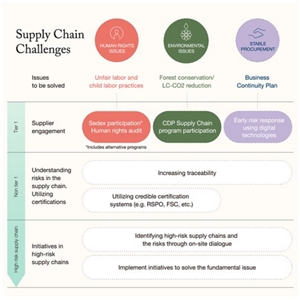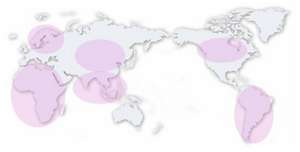Kao's Newly Unveiled Supply Chain ESG Promotion Guidelines Includes Third-party Audits of Suppliers
* The guidelines for responsibly sourced raw materials, which includes Supply Chain ESG Promotion Guidelines, was reorganized in June 2022 in order for business partners to understand Kao's vision in procurement. The Guidelines for Suppliers' Assessment was recreated as the Partnership Requirements for Suppliers, based on the conventional Policies for Procurement. Kao added new requirements there, which includes the establishment of a diverse and inclusive working environment and the promotion of decarbonization across the entire product lifecycle. Kao also revised the Supply Chain ESG Promotion Guidelines and renamed it the ESG Promotion Activities with Suppliers, as well as revising and renaming the Guidelines for Sustainable Procurement of Raw Materials as "High-Risk" Supply Chain Management and Sourcing, which are available on the company's website.
TOKYO, Aug. 24, 2021 — Kao Corporation has released its Supply Chain ESG Promotion Guidelines on its website. These guidelines will provide Kao with the framework to work with suppliers to ensure traceability and identify risks throughout the supply chain in relation to social issues, such as resource conservation, environmental protection, safety, and human rights. As part of these efforts, Kao will be arranging third-party audits of suppliers.
As an enterprise that supplies products people use in their everyday lives, Kao is working actively and responsibly to reduce the burden on the environment throughout the product lifecycle. In April 2019, Kao defined the Kirei Lifestyle as the type of sustainable lifestyle customers are increasingly demanding. As a result, Kao introduced the Kirei Lifestyle Plan—a new ESG strategy designed to help people realize this lifestyle. The Japanese word 'kirei' describes something that is both clean and beautiful. For Kao, Kirei not only encapsulates appearance, but also attitude—to create beauty for oneself, other people, and for the world around us. The Kirei Lifestyle Plan outlined 19 Kao Actions, one of which was "Responsibly Sourced Raw Materials." Kao has developed the following mid- to long-term targets in relation to this:
● 100% usage of certified paper products and pulp (FSC, PEFC, SFI) for consumer products by 2025.
● 100% traceability to small oil palm farms by 2025.
In order to realize the goal of "Responsibly Sourced Raw Materials," Kao expects its suppliers to comply with relevant laws and regulations, as well as demonstrate social responsibility and concern for the environment. Suppliers that meet these expectations are given priority in procurement. The Supply Chain ESG Promotion Guidelines Kao's existing Guidelines for Suppliers' Assessment, and to facilitate confirmation of compliance status using methods such as third-party audits. Violations will be handled appropriately, for example by providing guidance to help suppliers make improvements, or discontinuing the business relationship where necessary. In addition, Kao has classified supply chains as high-risk if they have been affected by serious issues regarding human rights and the environment. Kao is working to identify the risks through on-site dialogue to determine the nature of the issues, and to work together with suppliers and NGOs to find solutions, and make public the progress that is made.
By integrating ESG into the core of its company management, Kao will drive business growth and better serve consumers and society through its enhanced products and services. With this socially conscious ethos, Kao will create a Kirei life for all—providing care and enrichment for the life of all people and the planet.
Supply Chain ESG Promotion Guidelines
We are committed to securing the traceability of its supply chain by working together with our suppliers. We will work to source our raw materials in a way that protects natural resources, the environment, safety and human rights, with the aim of realizing a more vibrant and caring society.
Our commitment to compliance with laws and regulations and fulfilling our corporate social responsibility extends to our suppliers, and we prioritize procurement from suppliers who adhere to these principles. We also ensure that our Guidelines for Supplier's Assessment are understood by all of our suppliers and check their compliance through audits and other means. If our suppliers are found to be in contravention of these guidelines, we take appropriate action such as requesting improvements or discontinuing our business relationship with them. We will identify supply chains in our raw material procurement where there are significant risks to human rights or the environment. We will identify these risks through on-site dialogue, determine the nature of the issues, and implement activities to solve the issues together with our business partners and NGOs. Our progress will be tracked and reported.
1. Initiatives with our suppliers to promote ESG in the supply chain
We will engage in sustainable procurement of raw materials together with our suppliers. We work with suppliers that accept the standards upheld in Kao's Policies for Procurement and Guidelines for Supplier's Assessment. Suppliers are required to respect and protect human rights and the environment, and comply with laws and regulations throughout their procurement supply chain. The status of compliance of our suppliers will be monitored through third-party audits and other means.
Supplier engagement
1. We will increase traceability across our supply chain up to the procurement of raw materials by working together with our suppliers.
2. We will identify risks related to human rights and the environment in our supply chain and implement activities to mitigate them by working together with our suppliers.
3. We request our suppliers to join Sedex*1 (including alternative programs, such as Kao SAQ*2 ), participate in the CDP Supply Chain Program*3 and promote due diligence in terms of human rights and the environment. We will work with suppliers to make improvements when their efforts are found to be insufficient.
4. We conduct third-party audits of our suppliers (such as the SMETA*4 audit) and disclose the number of suppliers audited.
5. We promote the procurement of raw materials using third-party certification systems (RSPO, FSC, etc.) by working together with our suppliers.
6. We make efforts to reduce CO2 emissions relating to procurement for all raw materials by working together with our suppliers.
7. We will develop a system using digital technologies to effectively share information with our suppliers to build capacity for early response to issues as they arise by working together with our suppliers.
We define suppliers involved in the procurement of natural resources (natural oils and fats, paper and pulp, etc.) and those that conduct inadequate due diligence in terms of human rights and the environment as high-risk suppliers. Purchases from these suppliers must be approved by the Executive Officer in charge of purchasing on an annual basis. We prioritize conducting third-party audits of the high-risk suppliers to identify issues and request improvements to the identified issues.
-
* 1 Sedex (Supplier Ethical Data Exchange)
A large-scale, global platform for the sharing and verification of information relating to labor standards, health and safety, environmental protection and business practices, aimed at promoting the adoption and maintenance of ethical business practices in global supply chains. -
* 2 Kao SAQ, alternative programs
KAO SAQ: Kao's proprietary survey form that complements Sedex
Alternative programs: Alternative research programs to Sedex such as EcoVadis -
* 3 CDP Supply Chain Program
CDP is a nonprofit organization (with its headquarters in London) that is operated by institutional investors that requests business enterprises to disclose information relating to climate change, water and forests. The CDP Supply Chain Program is an initiative in which participating enterprises ask the firms that make up their supply chain to disclose information relating to climate change, water resource use and forest resource use via the CDP platform. -
* 4 SMETA (Sedex Members Ethical Trade Audit)
An audit format that covers the four pillars of Sedex: labor, health and safety, environment and corporate ethics.
2. Initiatives to identify high-risk supply chains and their fundamental solutions
We identify high risk supply chains in our raw materials procurement, from the following perspectives.
● Business perspective: Procurement amount and the possibility of replacement with alternative raw materials, etc. (identification of critical suppliers)
● Geographical perspective: The risks associated with the location of the supply chain up to the raw material
● ESG perspective: Results of supplier due diligence
Based on the above three perspectives, high-risk supply chains are identified and reviewed annually with the approval of the Executive Officer in charge of purchasing.
We identify risks through on-site dialogue within high-risk supply chains and take the initiative to conduct activities (training programs) with suppliers and NGOs to resolve the fundamental issue. We will track and report on the progress.
We identify supply chains related to palm oil and paper and pulp as high-risk supply chains and implement initiatives aimed at resolving their fundamental issues.

Tier 1: Our direct suppliers of raw materials
Non-Tier 1: All supply chains involved in our procurement of raw materials, excluding direct suppliers
Areas of potential human rights and environmental risk in our procurement supply chain

About the Kirei Lifestyle Plan
Over the past 130 years, Kao has worked to improve people's lives and help them realize more sustainable lifestyles—a Kirei Lifestyle. The Japanese word 'kirei' describes something that is clean, well-ordered and beautiful, all at the same time. In the Kirei Lifestyle Plan, Kao lays out its ESG (Environmental, Social and Governance) strategy that is designed to deliver this vision of a gentler and more sustainable way of living. By 2030, Kao aims to empower at least 1 billion people, to enjoy more beautiful lives and have 100% of its products leave a full lifecycle environmental footprint that science says our natural world can safely absorb.
For more information please click
About Kao
Kao creates high-value-added products that enrich the lives of consumers around the world. Through its portfolio of over 20 leading brands such as Attack, Bioré, Goldwell, Jergens, John Frieda, Kanebo, Laurier, Merries, and Molton Brown, Kao is part of the everyday lives of people in Asia, Oceania, North America, and Europe. Combined with its chemical division, which contributes to a wide range of industries, Kao generates about 1,400 billion yen in annual sales. Kao employs about 33,000 people worldwide and has 130 years of history in innovation. Please visit the Kao Group website for updated information.
Media inquiries should be directed to:
Corporate Strategy
Kao Corporation
